- Home
- Catherine Bateson
Lisette's Paris Notebook Page 2
Lisette's Paris Notebook Read online
Page 2
Surprisingly, there was a carousel on the street, right next to a metro station – and a map. I couldn’t find my street on it. My feet were aching and I wanted a shower more than anything else in the world.
‘Excuse me, honey.’ A woman approached, holding something out. ‘This might be more detailed.’ Her words were molasses-slow, in contrast to the low, rapid speech around us. She carried an impressive handbag firmly tucked under one arm. It was a bigger version of the anti-theft one Mum had tried to foist onto me before I left. Even if I hadn’t heard her voice I would have known she was American from her flat shoes, which, no matter how much they tried to look otherwise with cute straps and colourful soles, were just fancy runners.
‘I can’t read a map worth a dime,’ she said, ‘but if you turn it around and around, sometimes you get lucky. You know what I mean?’
Together we turned the map until we found my street and then she pulled out a purple pen and outlined my route. ‘You take it,’ she said. ‘They’re free and my husband’s collected half a dozen already. I just skip monument to monument myself – you memorise a few and they’ll take you all the way home. Metro stations are useful, too – hell, they are monuments over here.’
Her name was Ginger, she said, and she offered me a hot chocolate. I was about to refuse when I caught something in her eyes, behind the purple-framed spectacles, that reminded me of how lost I felt.
‘I’d love that,’ I said, ‘if you have the time.’
‘I’ve got time,’ she said firmly. ‘I’ve got all the time in the world. Todd’s in back-to-back meetings until dinner and dinner’s an age away. They all eat so late over here. I guess that’s European but I’m ready to eat an alligator by the time we finally sit down.’
We found a cafe and sat, rather doubtfully, side by side. The chairs were all lined up to face the street.
‘I’m not used to this,’ I whispered to her. ‘In Melbourne, even outside, the chairs are arranged so you can talk.’
‘It is so you can watch the people,’ the waiter, who had snuck up behind us, informed me haughtily. ‘In Paris we watch the people, the life, the fashions. In Melbourne, perhaps not so much?’
‘I don’t think he was real fond of your outfit,’ Ginger said when he’d whisked away with our order. ‘It’s a little out there.’ ‘It’s not that bad,’ I said, pulling at the skirt to align the safety pins. ‘But I know what you mean.’
‘At least you speak some French,’ she said comfortingly. ‘That will definitely help.’
I wasn’t so sure. Even though I had ordered in French, our waiter had replied in English. It was only my first day – I clung to that thought.
‘You’re so brave,’ Ginger told me as we said goodbye, ‘when I was your age I was doodling wedding dresses in the margins of my college books.’
‘But you’re here now.’
‘Sure. That’s what counts,’ she said, but she didn’t sound terribly certain. ‘You have – what do they say? Bonne chance, you hear!’
I followed the purple line all the way back to Madame Christophe’s and was about to knock on the closed shop door, but she popped out as if she’d been waiting, still in stilettos, scarf and fresh lipstick.
Paris is the centre of haute couture and all things stylish. That’s why Mum insisted on me learning French, the language of Chanel. My great-grandmother owned a Chanel jacket. It was called ‘The Jacket’, and she wore it on every grand occasion for as long as she could fit into it. Even now The Jacket, which hangs in my mother’s studio like the piece of art it is, smells faintly of Greatma’s perfume. Already Paris makes me feel gawky, as though I were thirteen again, copying the Year Ten girls.
‘I did not have a chance to give you the door code. And you have no sense of direction, so you were lost,’ Madame Christophe said, with some satisfaction, I thought.
It wasn’t a question but I answered anyway. ‘I met a woman, we had hot chocolate together and she gave me a map.’ I flourished it as proof.
‘An American. They have no memory, but large collections of maps. And before this American with her collection, what did you do? No, don’t tell me. You went to a shop. That is what you did. Your first afternoon in Paris and you shopped.’
‘I bought some goat’s cheese.’ I proffered the bag. ‘One is like a little pyramid. The other’s wrapped in a vine leaf. So pretty!’
‘That you would have bought on the way home. No one buys chèvre on the way out. You found the BHV.’
‘After walking for ages.’ Why did she have to sound so condemnatory?
‘Notre-Dame is across the Seine. There is also the Tuileries if you walk far enough. The Jardin des Plantes. But no, you visited a shop? Never mind. We remedy all tomorrow. For now you had better eat your chèvre and then sleep.’
I wanted to set up wi-fi on my laptop but apparently one couldn’t do that in the evening. Perhaps it interfered with Madame Christophe’s digestion? She would let me know how to log in at breakfast. She had already informed my mother of my safe arrival so I need not be anxious about that. Perhaps I should study my map and plan some instructive days in Paris, rather than wasting my time at the BHV? Clearly I would have to skip monument to monument to satisfy Madame Christophe.
I trudged upstairs to the bed that was too short for me. My first day was over. Mostly successful, I allowed myself, ticking off the pluses on my fingers: I had managed the airport and the RER, I’d found my apartment and met my . . . met Madame Christophe. I had become completely lost but the afternoon had been salvaged by meeting Ginger and managing my first cafe, Parisian style. I’d eaten baguette and goat’s cheese for dinner. I hadn’t needed to talk to Mum. I’d even squeezed myself into the miniscule shower in my ‘practically an ensuite’ and washed my hair. Not bad.
The next morning it was clear that not everyone had left Paris for the summer. It was six-thirty and I could hear the discrete sounds of people leaving their apartments. I was in Paris, the City of Love, and I would show Madame Christophe that I wasn’t at all interested in shopping. (Although I had seen some very cute earrings.)
I was expected – or permitted? – to breakfast with Madame Christophe each day. It was an agreement Mum and Madame Christophe had come to – partly, I was sure, so that Mum could keep a virtual eye on me. When I sauntered down, wearing a black T-shirt with braces, tartan shorts, knee-high socks and my Docs, I found the table set for an intimate petite déjeuner of croissants – surprise, surprise. Napoléon was already at Madame Christophe’s feet, looking up at the pastry while trying to maintain a certain emperor-like dignity.
‘I am organising you,’ Madame said, pouring coffee into my cup. ‘A friend of mine runs French classes for the art students and I have managed to convince her to put you in her class. It is a rare privilege.’
‘No need to do that,’ I said. ‘I’ll improve as I go along. It’ll be easy – I’ll just talk French to everyone. We could, too?’
Madame Christophe gave me a long, pitying look. ‘I need to practise my English,’ she said. ‘Also, your mother does not want you shopping. You are here to learn things.’
‘Madame Christophe, I don’t mean to offend you, but I am not a child. I am old enough to make my own decisions about what I do.’ Why did everyone think I needed every single thing decided for me?
But Madame Christophe had moved on and was reading the paper as she delicately dunked her croissant in a big milky bowl of coffee. Disgusting. Then she tore off the end and fed it to Napoléon. He growled at me. He was siding with his mistress.
Madame Christophe said something softly in French but Napoléon bared his teeth, which although small were sharp, despite an apparent diet of croissant.
‘Napoléon, this is our guest,’ she said severely, although I felt her tone was directed at me, rather than her absurd dog. Madame Christophe seemed to expect me to say something to him.
‘Good morning, Napoléon,’ I said. ‘It’s a big name for such a small dog.’
‘He was a small man, Napoléon Bonaparte. He was not, of course, French.’
I bit the inside of my cheek to prevent myself spluttering croissant across the table. Was she implying that Bonaparte would have been taller if he’d been French? And if he wasn’t French, what was he?
There was an awkward pause while I swallowed laughter and pastry.
‘I had no idea,’ I said conversationally, ‘that he was short. Or that he wasn’t French. I didn’t do history.’
This, unfortunately, captured her full attention. ‘What do you mean, you did not “do” history? What is this “do”? Of course you do not do history. History, it is made, not done. Do you mean you did not study history? That is an outrage.’
‘Oh, we did Australian history in primary school.’
‘Australian history. That would not have taken so long,’ she said and disappeared my country with a snap of her fingers. ‘You should have studied the history of Europe. Europe shapes the world.’
‘What about China?’ I asked. ‘China’s important.’
China was dismissed with an eloquent shrug. I reminded myself to tell Ami. She would have something to say about that!
‘It is excellent that you are to study French with my friend. You will find her knowledge and opinions extend beyond language. She is a woman of decision and elegance – her shoes! Oh là là! You will benefit. It will cost only ten euros for a lesson and you will attend twice a week. I will show you on the plan where to go.’
‘I’m not at all sure about attending French lessons.’
‘Your mother agrees with me. Ten euros is nothing compared to the education you will gain. An opportunity resembling this does not often happen.’
Ten euros a lesson – twenty euros a week. What was Mum thinking? I had to Skype her!
I told Madame Christophe firmly that I had to arrange internet access as soon as possible. I also ate a second croissant, avoiding Madame’s lifted eyebrow.
The wi-fi was easier to set up than negotiating a French mobile SIM card, which took forever. It was late in the afternoon by the time I got on to Mum.
‘It’s fantastic,’ she said. ‘Darling Sylvie has been able to organise—’
‘I know, right? At the cost of twenty euros a week, Mum! Do you know how much that adds up to by the end of my stay?’
‘It’s such a great opportunity, Lisi – you simply can’t walk away from that. Also, it’s a way to meet other kids. What I would have done at your age to learn French in Paris, Lisi!’
‘It’s not in my budget,’ I said flatly. ‘I want to go out too. I want to be able to eat an ice-cream in the Tuileries and there’s no point in meeting people if I can’t afford to go clubbing with them.’
‘Lisi, you don’t even like clubbing!’
‘Well, whatever. The thing is, Mum, I’m making my own decisions now.’
‘Lisi, I thought learning French in Paris was your dream?’
There was the problem. Mum had summed it up with unusual clarity. She thought this was my dream. If it had been left up to me, I wouldn’t have even taken a gap year. I would have gone to uni with Ami and hung out in the cafes and bars. But it was useless telling Mum that. It was useless arguing against her. She was too persuasive. She had it firmly fixed in her head that a gap year was essential and three months in Paris would set me up for the years of study ahead. In the end, I’d taken up her idea of coming to Paris as much to find myself, away from her, as to discover Paris. Sure, I could justify it by saying I was here for the art – an opportunity to see the real things before studying Arts (if that was what I was going to do). If I’d been driven by any real ambition, I could have stood up to Mum. But I didn’t have a clear picture of my future self. Who was I? Who could I become? I was far less interested in the labyrinths of the Louvre than I was in the secrets of my own heart. I loved being able to speak French, sure. It had great show-off cred – but was it my actual heartfelt, close-held dream?
‘I’ll transfer the money tomorrow,’ Mum said, and I could hear the resignation in her voice. ‘It can be my little gift.’
‘It’s not about the money,’ I said. I’d started with the wrong argument and I’d lost. It was going to end up like everything else – I’d resist, briefly, then surrender and the lines between what I wanted and what Mum wanted would blur as though they were drawn in charcoal, not permanent ink.
‘Then what is it?’
I sighed. I needed a clearer outline of myself, but even this far from home I was all shade and shadow. If I argued with Mum she just became sad, hardly ever angry. Her sadness made my edges collapse.
‘It’s just that I don’t like having something like this foisted on me.’
‘But darling, travel means taking up opportunities. I thought we’d agreed on that. This is clearly an opportunity.’
We’d agreed? I couldn’t argue anymore. ‘According to an American woman I met, travel is skipping from monument to monument.’
‘I’m sure you’ll have time to do that too. The lessons are only twice a week. You’ll have them with a bunch of art students. It’s very generous of Sylvie to organise them. I do hope you sounded grateful, Lisi, and didn’t display that sulky teenage side.’
‘Mum! You’re treating me like a kid!’
‘Sorry,’ she said, ‘I think the connection is a little problematic. I can’t really hear you. I’ll put the money in your account and you make the most of this, Lisi, okay? I’m trusting you to do that. I can’t wait to hear all about it. Love you. Love you so much, darling.’
‘Love you, too,’ I replied automatically. It was interesting that the Skype connection was clear enough for her to deliver a mini lecture, but too dodgy for her to hear my side of the argument.
I got up and looked out the window. The small street was cobblestoned. I could see half a dozen people wandering past and as many dogs. There were two couples, leaning into each other as they walked. I supposed I could find out more about the lessons. Who were these art students? Maybe it wasn’t such a bad idea. Art students were bound to be interesting, if a bit hipster. Suddenly it didn’t sound so pedestrian to be taking French lessons in Paris.
I could see myself at uni the following year, dipping a croissant in my latte and saying, ‘Of course, I was in Paris, learning French and living with this mad clairvoyant my mother had met over the internet. Madame had the smallest dog in the world called Napoléon, because he was a short man and not French.’
‘Wow!’ my audience would exclaim. ‘That must have been so awesome.’
The story would be better with a French romantic interest. He’d have that kind of hair that droops into one eye. I clearly wasn’t going to meet a French boy at French class, but the other students would have friends and they’d be French artists. We’d all go clubbing or whatever you did in France – probably something more philosophical. He’d call me Lise from the start, but maybe Lisette when he was being romantic. We’d drink absinthe. Actually, I probably wouldn’t. I don’t drink anything green. But I could pretend.
To be honest, I hadn’t had a great deal of success with Australian boyfriends – but that was to be expected at my school. The hot boys were interested in two things only: sport and sex. The physics nerds couldn’t look at girls without stuttering. Then there’d been Ben. He’d managed whole sentences. Not that it mattered in the end.
If a French boyfriend presented himself, I’d certainly say yes to opportunity!
STILETTOS
I don’t wear them. Neither does my mother. Although she does wear their younger sister, kitten heels. High heels were originally invented so the wealthy could rise above the mud and crap (literally) that flowed down the city streets. Then in the 1950s, a Frenchman revisited that idea, but gave it his own sadistic twist by narrowing the heel to the stiletto as we know it; capable of performing a lobotomy at a pinch. I wear flat shoes. I like to pretend I’m firmly grounded and anchored to the world.
The French lessons were on Tuesday and Thursday mo
rnings at ten-thirty and lasted for two hours, Madame Christophe told me, or until her friend Fabienne, Madame Fontaine, decided to stop. She was generous with her time. Until Tuesday, Madame Christophe recommended I improve my mind.
‘The Louvre?’ I asked, unfolding my map.
‘Definitely before the Americans arrive for the summer. But perhaps first the more intimate Musée d’Orsay or Musée de l’Orangerie.’ Of course, she added, if I preferred to shop, and she could quite understand that I needed some good clothes, there were many beautiful boutiques in the arrondissement, but really I’d be better off waiting for the sales. That’s what Parisians did. The sales would begin at the end of the month and last for six weeks. I would have plenty of time to choose my purchases before the end of my Paris stay.
Clearly I was never going to convince her that I wasn’t a confirmed shopper.
With this advice, my interview was over and Madame Christophe sallied forth with Napoléon for his morning walk after reiterating that I was to provide my own lunch and dinner, implying that the breakfast deal should make me feel special. It was a rare arrangement.
I trudged back up the stairs to chart my route. I was going to work this city out. Ten minutes later I was doing exactly that. Along the Seine, past the bookstalls I’d seen in photos – most of which, admittedly were shut up and locked. Every so often I stopped and pinched myself. I was walking along the Seine! I was in Paris! I took a billion photos.
I wasn’t sure what kind of drugs Madame Christophe had been taking with her breakfast, but to call the Musée d’Orsay ‘intimate’ was like saying a Great Dane was a tad larger than Napoléon – the dog, that is. The place was huge and jam-packed with famous art. What else had I expected? Except this was famous famous. I’d turn a corner and there would be another painting I recognised from a reproduction – Van Gogh, Degas, Rodin. I couldn’t take it all in.

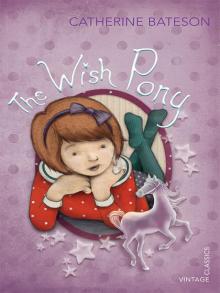 The Wish Pony
The Wish Pony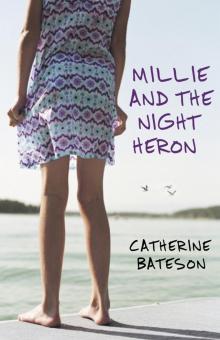 Millie and the Night Heron
Millie and the Night Heron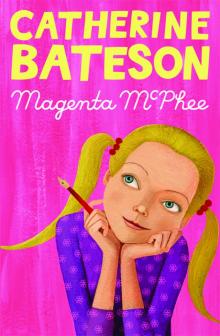 Magenta McPhee
Magenta McPhee Painted Love Letters
Painted Love Letters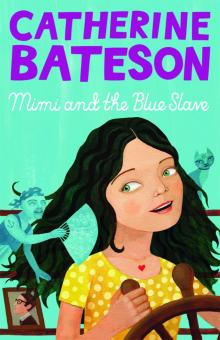 Mimi and the Blue Slave
Mimi and the Blue Slave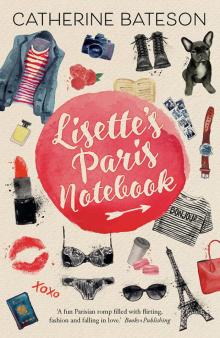 Lisette's Paris Notebook
Lisette's Paris Notebook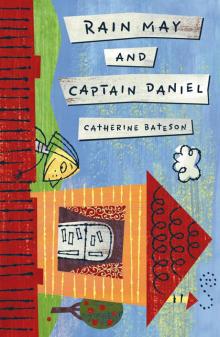 Rain May and Captain Daniel
Rain May and Captain Daniel